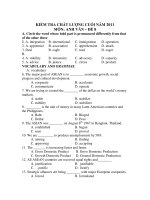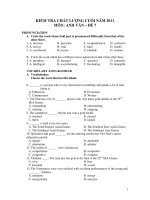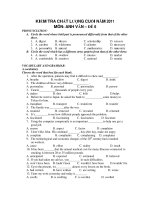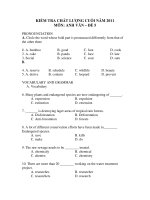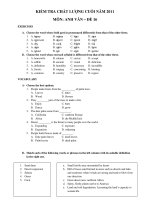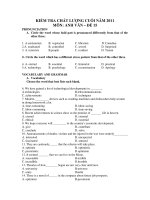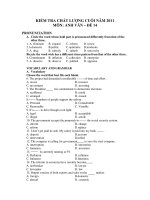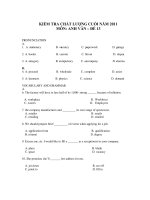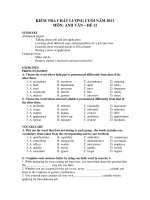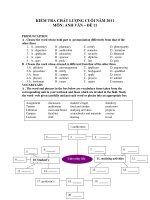KIỂM TRA CUỐI NĂM 2011 MÔN: ANH VĂN ppsx
Bạn đang xem bản rút gọn của tài liệu. Xem và tải ngay bản đầy đủ của tài liệu tại đây (69.98 KB, 5 trang )
nguyenlanhuong Page 1 8/18/2011
KIỂM TRA CUỐI NĂM 2011
MÔN: ANH VĂN
I. PHONETICS
1. Choose the word whose underlined part is pronounced differently from that of the others in each
group.
1. a. young b. about c. account d. sound
2. a. astronaut b. anchor c. spaceman d. capsule
3. a. Christmas b. anchor c. chemistry d. cheque
4. a. deliver b. different c. diagram d. disease
5. a. hurl b. pull c. June d. would
6. a. allow b. how c. account d. country
7. a. trade b. payment c. relation d. bank
8. a. value b. change c. actual d. transaction
9. a. holder b. bore c. important d. score
10. a. credit b. service c. letter d. specified
2. Pick out the word whose main stressed syllable is different from the rest.
1. a. farmer b. farewell c. factory d. fairy
2. a. cattle b. country c. canal d. cover
3. a. money b. machine c. many d. mother
4. a. borrow b. agree c. await d. prepare
5. a. government b. condition c. Parliament d. fortunate
II. VOCABULARY
1. Choose the best answer
1. The person who writers symphonies or concertos is a _____ .
a. composer b. conductor c. pianist d. playwright
2. We call the very large group of musicians that includes string and wind instruments a(n) _____ .
a. band b. musical c. orchestra d. trio
3. The police are _____ an incident which took place this afternoon.
a. inspecting b. searching c. looking out d. investigating
4. Someone wants you to _____ a good hotel.
a. introduce b. direct c. recommend d. tell
5. She used to _____ her living by working as a typist.
a. win b. earn c. raise d. support
6. My brother is intelligent but he _____ common sense. a. fails b. lacks c. misses d. wants
7. We'll play tennis and _____ we'll have lunch. a. after b. then c. so d. immediately
8. The Blacks live in the house _____ the green doors. a. have b. with c. which d. where
9. It never _____ my mind he will lie to me.
a. crosses b. enters c. happens d. takes
10. Please ring to make an early _____ at the dentist.
a. assignment b. order c. date d. appointment
2. Read the passage and choose the best answer.
An increasing number of people are now going on holiday to Egypt. Last year, for example, about one and
a half million (1) _____ visited Egypt. The (2) _____ of Egypt is about fifty million and the (3) _____ is El
Qahira (Cairo), a busy city of just under nine million people. Although the (4) _____ is hot and dry and
most of the country is desert, the average (5) _____ from October to March is not too high. The most (6)
_____ sights are pyramids at Giza. However, it is also pleasant to (7) _____ Alexandria, Port Said and
several other places and do as much (8)_____ as possible in the time available. A (9) _____ to Luxor is an
unforgettable experience, and there are frequent (10) _____ there from Cairo.
1. a. explorers b. voyagers c. tourists d. passengers
2. a. people b. town c. nation d. population
3. a. principal b. head c. state d. capital
4. a. temperature b. climate c. condition d. position
5. a. weather b. measure c. climate d. temperature
nguyenlanhuong Page 2 8/18/2011
6. a. famous b. known c. visited d. asked
7. a. search b. require c. examine d. visit
8. a. viewing b. seeing c. sightseeing d. looking
9. a. picnic b. trip c. guide d. entertainment
10. a. flights b. travels c. journeys d. trips
III. GRAMMAR. Choose the best answer
1. Tuberculosis _____ an infectious disease. a. was b. has been c. would be d. is
2. Pasteur _____ in the 19th century.
a. was living b. lived c. had lived d. has lived
3. Since 1980, scientists the world over _____ a lot of things to fight against AIDS.
a. have done b. are doing c. did d. had done
4. At present, they _____ with the medicines to cure this terrible disease. a. have experimented
b. are going to experiment c. are experimenting d. have been experimenting
5. Many people _____ of malaria, smallpox before the process of vaccination was invented in the
19th century. a. have died b. had died c. would die d. were dying
6. Our government _____ a system of private schools in a near future.
a. was developing b. has developed c. would develop d. is going to develop
7. The doctor said that his appetite _____ him restore his health quickly.
a. has helped b. helps c. would help d. is helping
8. Now my sister _____ a bicycle of her own.
a. is having b. are having c. has d. had
9. A football team _____ chiefly of 12 players.
a. composed b. composes c. comprised d. comprises
10. This is the first time I _____ here. a. am b. have been c. was d. be
11. Last week, my professor promised that he _____ today.
a. would come b. will come c. comes d. coming
12. My girl friend arrived after I _____ for her about half an hour.
a. was waiting b. had been waiting c. have been waiting d. have waited
13. Did she say she _____ him tomorrow?
a. has visited b. will visit c. would visit d. is going to visit
14. _____ to rain before you woke up this morning?
a. Did it begin b. Has it begun c. Had it begun d. Would it begin
15. My daughter saw an elephant this morning but she _____ one before.
a. had never seen b. has never seen c. never sees d. never had seen
16. I _____ in Da Nang before I moved to Dong Nai.
a. have been living b. have lived c. had lived d. had been living
17. There are many ways _____ to Rome.
a. is leading b. are leading c. leading d. led
18. I just want to know what you _____ at this time tomorrow afternoon.
a. are going to do b. will be doing c. are doing d. do
19. I am reading this novel. By the time you come back from work I _____ .
a. shall finish b. will finish c. shall have finished d. have finished
20. Tarkiss worked hard so that he _____ himself.
a. can support b. could support c. is able to support d. may support
IV. USE OF ENGLISH
Choose the underlined word or phrase in each sentence that needs correcting.
1. Our new television (A) came with a (B) ninety-days warranty (C) on all electrical (D) components.
2. It is (A) difficult to get used (B) to sleep in a tent after (C) having a soft, comfortable bed (D) to lie
on.
3. The director felt (A) badly about (B) not giving Mary the position (C) that she (D) had sought with
his company.
nguyenlanhuong Page 3 8/18/2011
4. Tom and Mark hope (A) go skiing (B) in the mountains this weekend (C) if the weather (D)
permits.
5. (A) The political candidate talked as if she (B) has already (C) been elected (D) to the presidency.
6. (A) They wanted him (B) understand that they wanted (C) some milk and (D) sandwiches.
7. (A) Even though she (B) looks very young, she is twice (C) older than my (D) twenty-year-old
sister.
8. (A) Despite his (B) smiling face, the (C) second-place contestant is (D) more sadder than the
winner.
9. I do not believe that I (A) have ever seen as many expensive cars (B) than (C) were in (D) that
shopping center.
10. (A) The members of the orchestra (B) had to arrived an hour (C) prior to (D) the performance for a
short rehearsal.
V. READ THE TEXT CAREFULLY AND THEN CHOOSE THE CORRECT ANSWERS.
Galileo Galileo was born in 1564 in the city of Pisa, Italy. About twenty years later he attended the
University of Pisa. At first he wanted to become a doctor, but while he was there he became interested in
science and decided to become a scientist. In 1592, a year after his father's death, the University of Padua
invited him to be a professor of mathematics. He stayed there for 19 years, where he became interested in
the stars. He made an instrument which made far-away things look larger and easier to examine. This was
called the telescope. When he was studying the stars, he discovered that the "stars" which moved were not
really stars, but worlds like the earth. He proved the Copernicus was right; the earth and the planets indeed
moved around the sun.
1. Galileo attended the University of Pisa in _____ .
a.1564 b.1584 c.1592 d.1593
2. Galileo's father died _____ .
a. in 1591 b. in 1592 c. in 1593 d. when he was studying the stars.
3. He made the telescope because he wanted _____ .
a. to become a good professor of mathematics b. to prove that Copernicus was right
c. to discover some new planets d. to study the stars
4. The telescope helped him _____ . a. to examine far-away things easily
b. to look everything around him early c. to see the earth d. to discover new planets
5. Which of the following statements is not true?
a. Galileo was interested in the stars b. Galileo made an instrument to study the stars
c. Galileo proved that the earth and the planets moved around the sun.
d. Galileo discovered that the stars which moved were not really stars
VI. STRUCTURES
Choose the correct sentence which has the same meaning as the given one.
1. Somebody cleans the room every day.
a. The room every day is cleaned. b. The room is every day cleaned.
c. The room is cleaned every day. d. The room is cleaned by somebody every day.
2. They cancelled all flights because of fog.
a. All flights because of fog were cancelled.
b. All flights were cancelled because of fog.
c. All flights were because of fog cancelled.
d. All flights were cancelled by them because of fog.
3. People don't use this road very often.
a. This road is not used very often. b. Not very often this road is not used.
c. This road very often is not used. d. This road not very often is used.
4. Somebody accused me of stealing money.
a. I was accused by somebody of stealing money. b. I was accused of stealing money.
c. I was accused of stealing money by somebody. d. I was accused stealing money.
5. How do people learn languages?
a. How are languages learned? b. How are languages learned by people?
nguyenlanhuong Page 4 8/18/2011
c. How languages are learned? d. Languages are learned how?
nguyenlanhuong Page 5 8/18/2011
ANSWER KEY
I. 1.
1.a 3.d 5.a 7.d 9.a 2.c 4.c 6.d . 8.b 10.b
2.
1.b 2.c 3.b 4.a 5.b
II.
1.
1.a 3.d 5.b 7.b 9.a 2.c 4.c 6.b 8.b 10.d
2.
1.c 3.d 5.d 7.d 9.b 2.d 4.b 6.a 8.c 10.a
III.
1.d 5.b 9.b 13.c 17.c 2.b 6.d 10.b 14.c 18.b 3.a 7.c 11. a 15. a 19.c 4.c 8.c 12.b 16.d 20.b
IV.
1.b 3.a 5.b 7.c 9.b 2.b 4.a 6.b 8.d 10.b
V.
1.b 2.a 3.d 4.a 5.c
VI.
1.c 2.b 3.a 4.b 5.a
